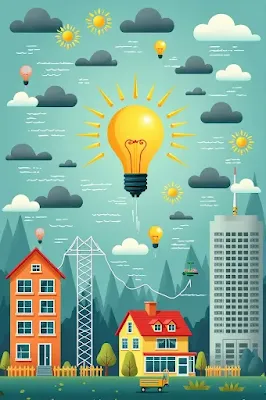How Can We Save Power and Energy in Our Daily Life and Its Impact on Economy, Environment & Personal Life
Practical Ways to Save Power and Energy Daily
1. Switch to Energy-Efficient Appliances
Modern energy-efficient appliances consume significantly less power than older models. Look for appliances with an energy star rating, which guarantees that they meet specific efficiency standards.
2. Adopt LED Lighting
LED lights use up to 80% less energy than traditional incandescent bulbs. By switching to LED lighting, households and businesses can cut down on their electricity consumption for lighting.
3. Unplug Unused Devices
Many electronic devices continue to draw power even when turned off, a phenomenon called "phantom load." Unplugging devices when not in use or using power strips that can be turned off with a switch reduces wasted electricity.
4. Optimize Heating and Cooling
Properly insulating homes, sealing windows, and using energy-efficient heating, ventilation, and air conditioning (HVAC) systems can reduce the amount of energy needed to heat or cool spaces. Simple steps like setting thermostats to moderate temperatures or using fans can also reduce energy use.
5. Maximize Natural Light
Arrange living and working spaces to make the most of natural sunlight. By utilizing natural light, you reduce the need for artificial lighting, especially during the day.
6. Embrace Renewable Energy Sources
For those who can afford it, investing in solar panels or small wind turbines for household use can reduce dependency on fossil fuels and cut electricity bills. Governments often offer tax incentives or subsidies for renewable energy installations, making them more accessible.
7. Practice Energy-Conscious Cooking
Simple steps like using lids on pots, matching pot sizes to burner sizes, and using energy-efficient kitchen appliances can lead to significant energy savings in the kitchen.
8. Carpooling & Public Transportation
Reducing individual car use by carpooling, using public transportation, biking, or walking when possible lowers fuel consumption and reduces air pollution.
9. Wash Smart
Use washing machines and dishwashers only with full loads and at low temperatures when possible. Air drying clothes also reduces energy use associated with dryers.
Impact on Economy
Reduction in Energy Costs: Households and businesses save on monthly utility bills by cutting down on power consumption, leading to increased disposable income and potential business growth. These savings can then be reinvested in the economy, contributing to job creation and economic stimulation.
Lower Demand for Imported Energy: Many countries rely on energy imports to meet demands. By decreasing overall energy consumption, countries can reduce their dependence on imported fossil fuels, thereby improving trade balances and strengthening energy security.
Incentive for Green Jobs: As more people adopt energy-efficient practices and renewable energy solutions, demand for green technologies and skilled labor in the green sector increases. This transition promotes the growth of industries centered around sustainability, driving economic diversification.
Impact on the Environment
Reduction in Greenhouse Gas Emissions: Most energy production still relies on fossil fuels, which release carbon dioxide (CO₂) and other greenhouse gases into the atmosphere. By saving energy, we reduce the need for power generation, which directly cuts down on emissions contributing to global warming and climate change.
Preservation of Natural Resources: Conserving energy translates to a decrease in the demand for fossil fuels, leading to reduced extraction activities. This helps conserve natural landscapes, forests, and ecosystems that might otherwise be disturbed or damaged by mining and drilling operations.
Improved Air Quality: Reduced energy consumption lowers emissions of pollutants, like nitrogen oxides and sulfur dioxide, that contribute to smog and acid rain. Consequently, air quality improves, leading to healthier communities with fewer respiratory and cardiovascular diseases.
Less Waste and Pollution: Lower energy demand also means less production-related waste. From mining waste to water pollution from power plants, reducing the need for energy generation lessens the overall environmental footprint of energy production.
By implementing energy-saving practices in our daily lives, we contribute to a more sustainable future. The impact on the economy includes cost savings, increased green jobs, and greater energy independence, while the environmental benefits include lower emissions, better air quality, and the preservation of ecosystems. Through these small, daily actions, each of us can contribute to a healthier planet and a stronger, more resilient economy.
Individual Benefits of Saving Power and Energy in Daily Life
Taking steps to save power and energy in our personal lives can lead to numerous benefits beyond just environmental and economic impact. Here’s how these practices can directly improve our quality of life:
1. Lower Utility Bills
Energy-saving measures, like using energy-efficient appliances, unplugging devices, and optimizing heating and cooling, lead to lower electricity bills. For many households, this can add up to significant annual savings, which can then be directed towards other expenses or personal goals.
2. Increased Comfort and Health
Practices like sealing windows, using LED lighting, and maintaining optimal temperatures help create a more comfortable and stable home environment. Moreover, improved air quality from reduced emissions benefits respiratory health and overall well-being.
3. Reduced Stress from Financial Savings
Monthly savings on utilities can ease financial pressure, especially for those on tight budgets. Knowing that your energy consumption is under control provides a sense of stability and can reduce financial stress, leading to a better quality of life.
4. Better Home Value
Homes with energy-efficient features, like upgraded insulation, efficient lighting, and solar panels, tend to have higher market values. Energy-efficient homes are often more appealing to potential buyers and can command higher resale prices in the real estate market.
5. Sense of Contribution to Environmental Conservation
Practicing energy conservation can give individuals a sense of satisfaction and purpose, knowing they’re contributing to a larger goal of protecting the planet. This sense of responsibility can lead to greater fulfillment and motivation in other areas of life.
6. Less Maintenance and Longevity of Appliances
When devices and appliances run efficiently, they often experience less wear and tear. This can extend their lifespan and reduce the need for repairs or replacements, saving additional money and effort in the long run.
7. Opportunity to Invest in Other Priorities
With energy savings, individuals have extra funds to invest in personal development, family activities, or other financial priorities. These savings can also be reinvested in energy-efficient upgrades, creating a cycle of long-term financial and environmental benefits.
8. Enhanced Awareness and Habits
Making conscious efforts to save energy fosters a sense of mindfulness and awareness in daily routines. This awareness can positively influence other lifestyle habits, promoting resourcefulness, planning, and conscious living.
By making energy-saving decisions, individuals not only improve their finances and quality of life but also foster healthier, more sustainable habits that can benefit both themselves and the broader community over the long term.




Comments
Post a Comment